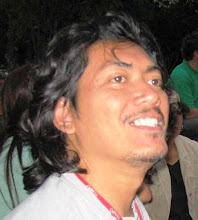
Last weekend, my friends and I went to
Rancaupas for three days camping night to enjoy the nature, make a bond with earth, inhaling the clear air of no pollution…okay okay, it’s actually just another excuse to have some local beers and smoke weeds, but hey, I found myself more released after dealing with life's turbulence .
Rancaupas is a 215 ha camping ground located 43 km south of Bandung. It surrounded with hills, swamps, and dense forest. Rancaupas is cold people so make sure to bring your mattress, sleeping bag, and jacket and the weeds and the beer. And have a lot of laugh under the star-blanketed sky or you go around or just sitting to contemplate if you think your life is so miserable :-( just under the moonlight...
What I want to say is actually on how to deal with
emotional turbulence. This is what Dr.
Deepak Chopra—an Indian physician and famous author who has written extensively on spirituality and diverse topics in mind-body medicine—said about dealing with emotional turbulence:
"It's not easy to deal with painful emotions head-on. But it's a key to good health and well-being physically, mentally and spiritually. If we don’t deal with pain when it occurs, it will resurface as compounded emotional toxicity later on — showing up as insomnia, hostility and anger or fear and anxiety.
As a further complication, if you don’t know how to deal with feelings of anger and fear, you're likely to turn them inward at yourself, believing, “It’s all my fault.” That guilt depletes our physical, emotional and spiritual energy until any initiative or movement feels impossible. We feel exhausted and paralyzed, leading to depression.
You can learn how to recognize painful emotions right away and how to effectively "metabolize" and eliminate pain.
Overcoming difficult emotions such as fear, anger, guilt and anxiety can bring the same disguised benefits that dealing with a physical illness can bring. Patients suffering from life-threatening illness often report that their diseases have taught them to love and value the other people in their lives more deeply than before they became ill. During recovery they learn to appreciate and understand areas of life that they took for granted before. While anger, fear and worry are not diseases, we can grow from them even as we process them to become the person we want to be.
By turning to our inherent intelligence, harmony and creativity, we can create a positive outcome; but if we are emotionally turbulent, we are too agitated to access that possibility."
Whenever you feel upset try to free yourself from emotional turbulence and the underlying pain. When you do that, you’ll find that opportunities will arise more often in every area of your life.
"Turbulence is life force. It is opportunity. Let's love turbulence and use it for change. "
— Ramsey Clark













